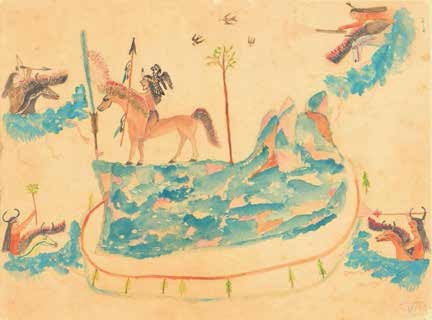Book Review: Black Elk Speaks

Black Elk Speaks is autobiography in one sense (You could also say Plato’s Republic is a record of some people conversing about their lives in Athens a long time ago). Much has been made of the relationship between the author, Black Elk, and the writer, John G. Neihardt, often to the effect that Neihardt imposed his own convictions about the Sioux and their history on the account Black Elk gave. Could he possibly have done anything else? There is no such thing as “perfectly” objective account under any circumstances, least of all when there are endless, difficult decisions to make about equivalents between two such radically different languages as Sioux and English, interpretations of one life experience into another — i.e., native American to emigrant in the 19th century, synchronising radically different conceptions of time, history, memory — one primarily oral and one profoundly literate. Perhaps. Black Elk had decided he wanted to produce a written — English — record of his life, possibly before he even met Neihardt, and Neihardt was understandably honoured by the invitation to act as “scribe”. I see no reason to doubt this, or to question the details of the situation in which the book was produced: Black Elk spoke in his native language — Oglala Sioux. Black Elk’s son Ben Black Elk translated into spoken English, Neihart’s daughter — a skilled stenographer — transcribed the English on to paper, and Neihardt based the book on the transcription.
In principle, Neihardt could have invented Black Elk, giving us a fictional character that he–Neihardt — wanted: exceptionally gifted, widely respected, articulate, a man who had participated in critical historical events of his time and place. By the same reasoning, Plato could have invented Socrates, and the evangelists could have invented Jesus. We don’t know. Most of us accept the general shape of the story, the existence and strong, unique character, the of the subject, aware of many factors that colour the impressions we can absorb from a specific text. To reject such a text for failing to meet some fairly arbitrary standard for “historical accuracy” seems short-sighted at best. That said, it is at least puzzling that Neihardt either failed to notice or deliberately omitted any mention of Black Elk’s having learned some English and further, of his having at some point converted to Catholicism .
I found the text impressive — evidence of an astonishingly detailed memory, a generous, honest, unaffected, often poetic voice. It asks to be read in a perspective supplemented with other kinds of documents, anthropological, archeological, and artistic. Perhaps it asks as many questions as it answers. Still, it supplies a kind of benchmark, testimony about American history and sensibility that Americans would do well to read, carefully, humbly and thoughtfully.


